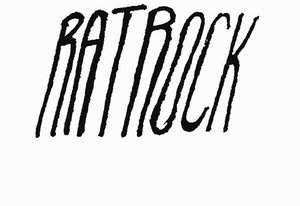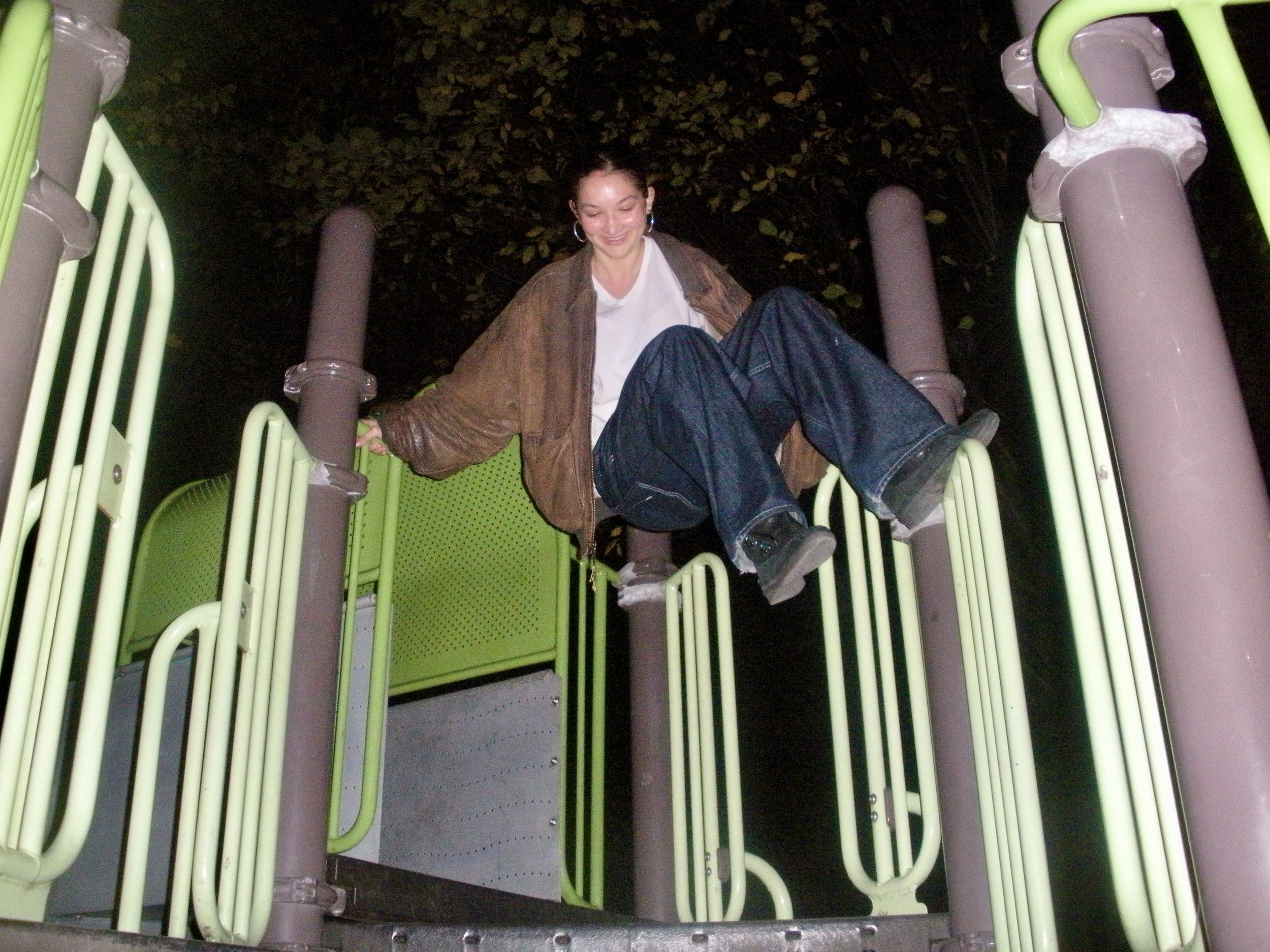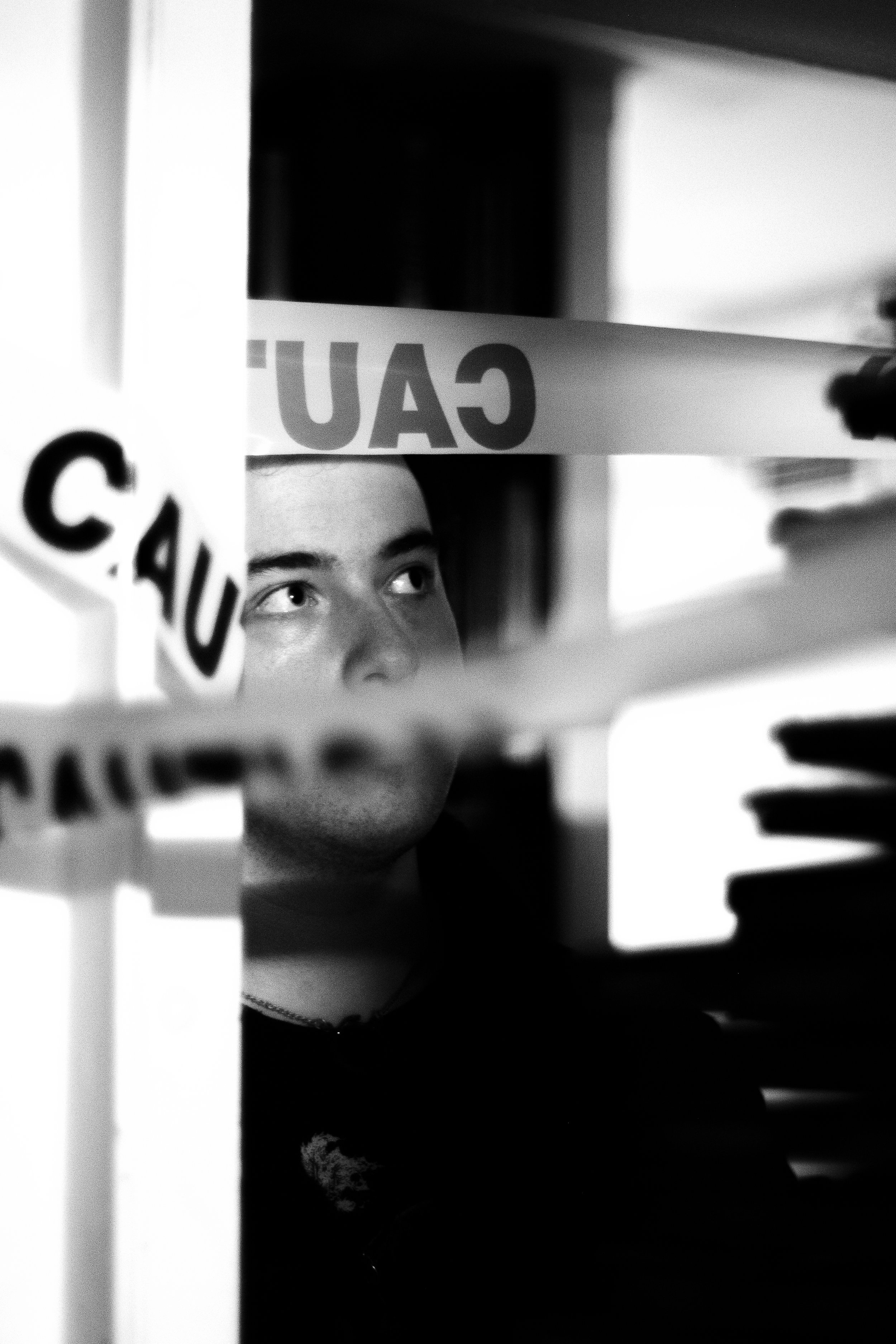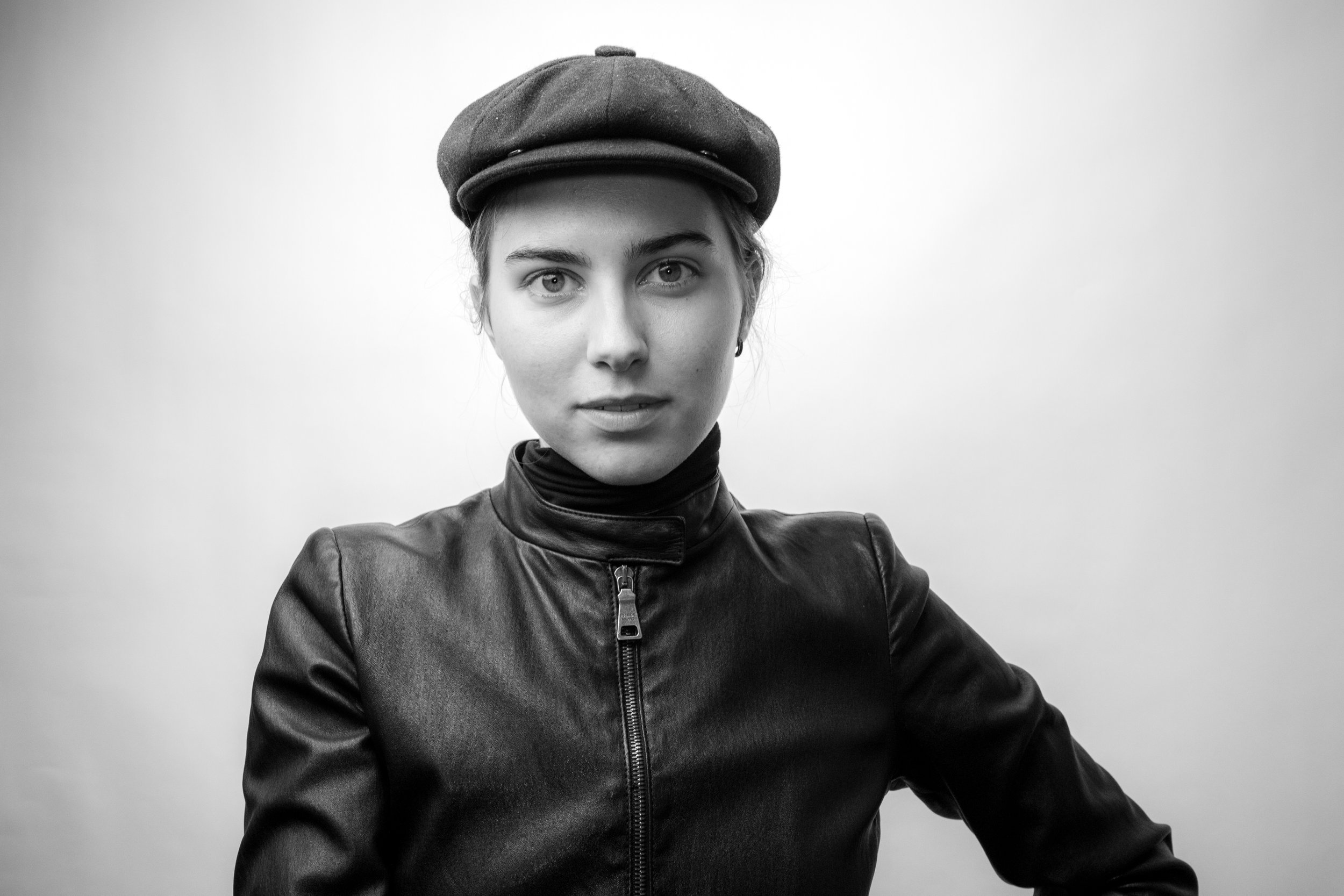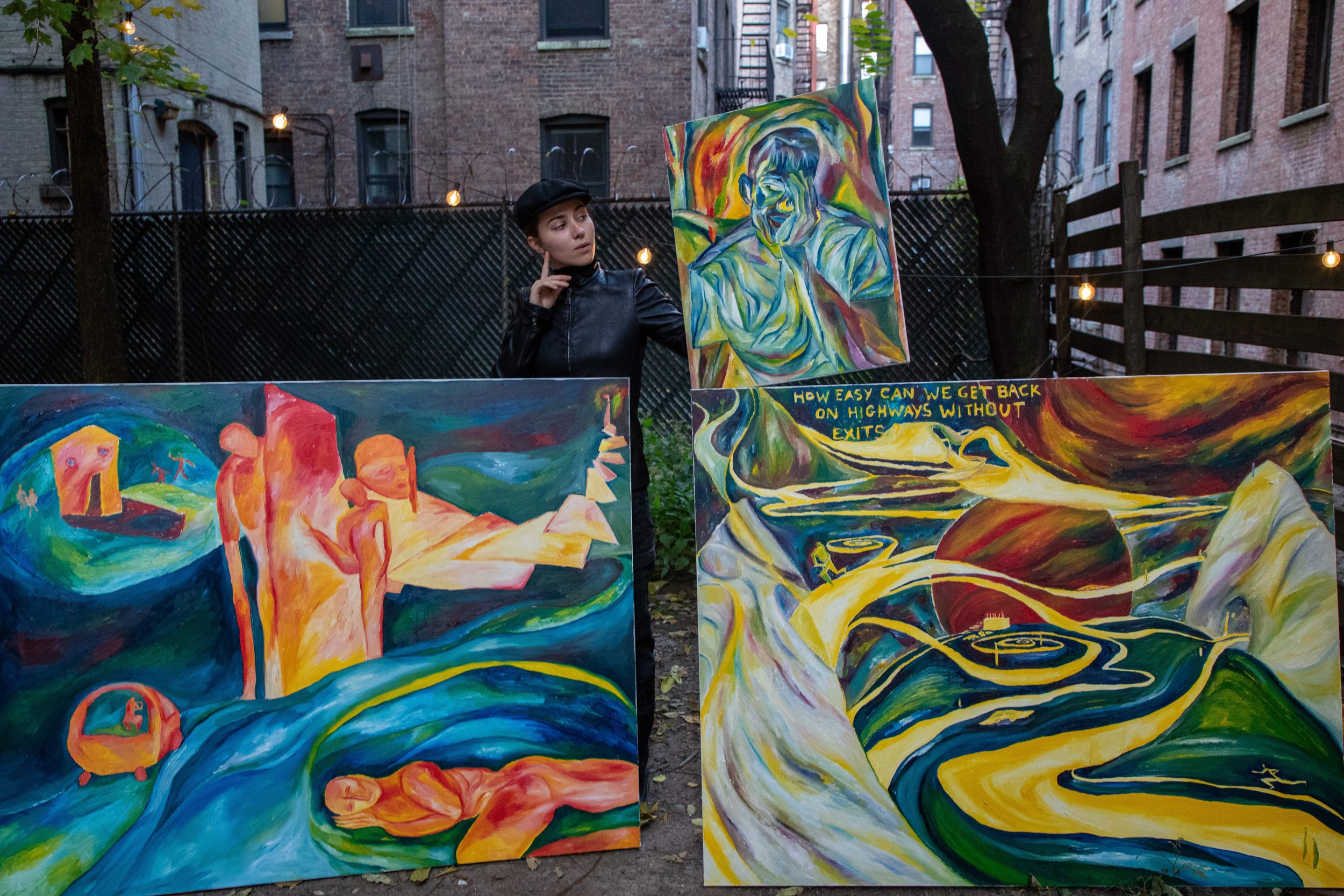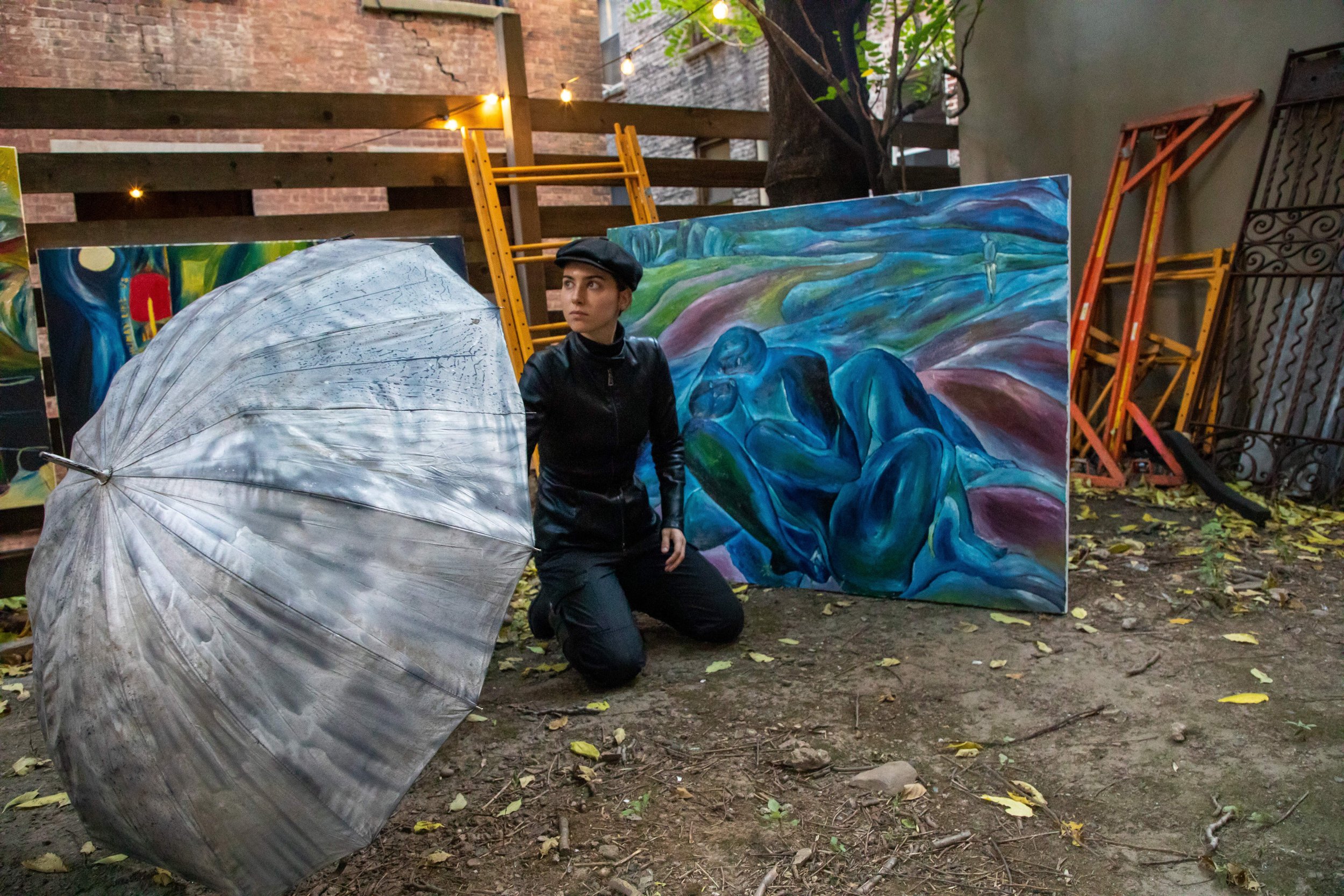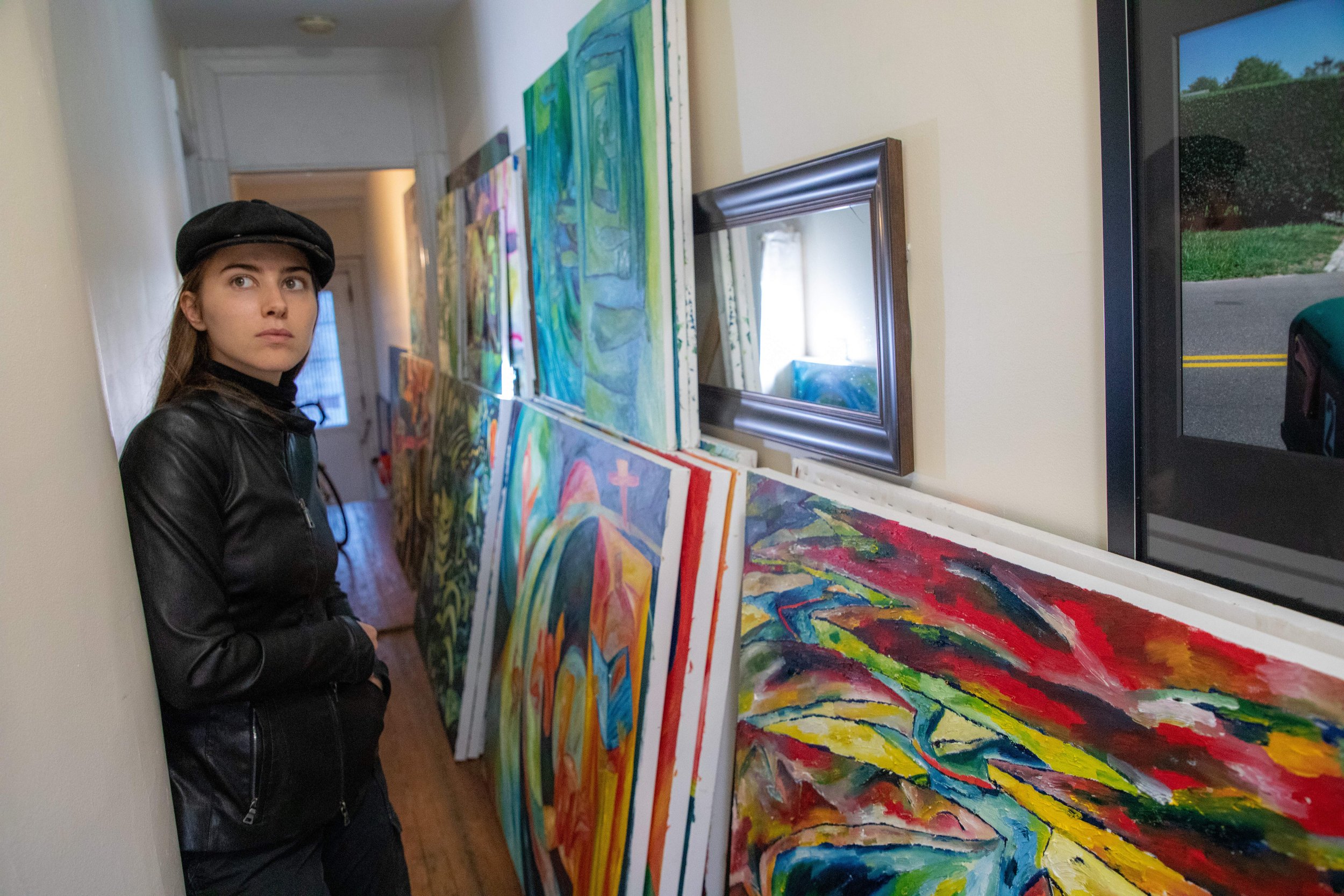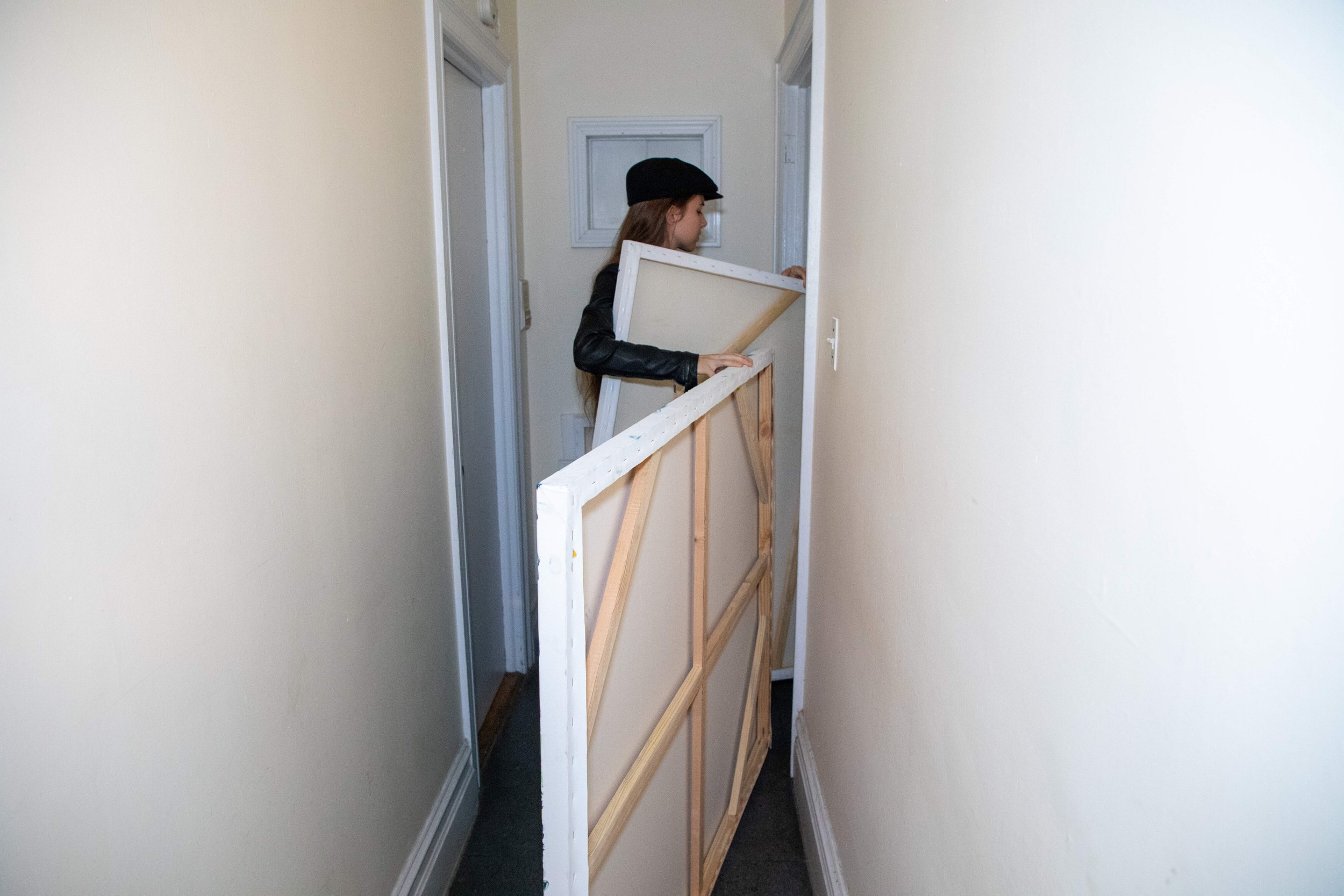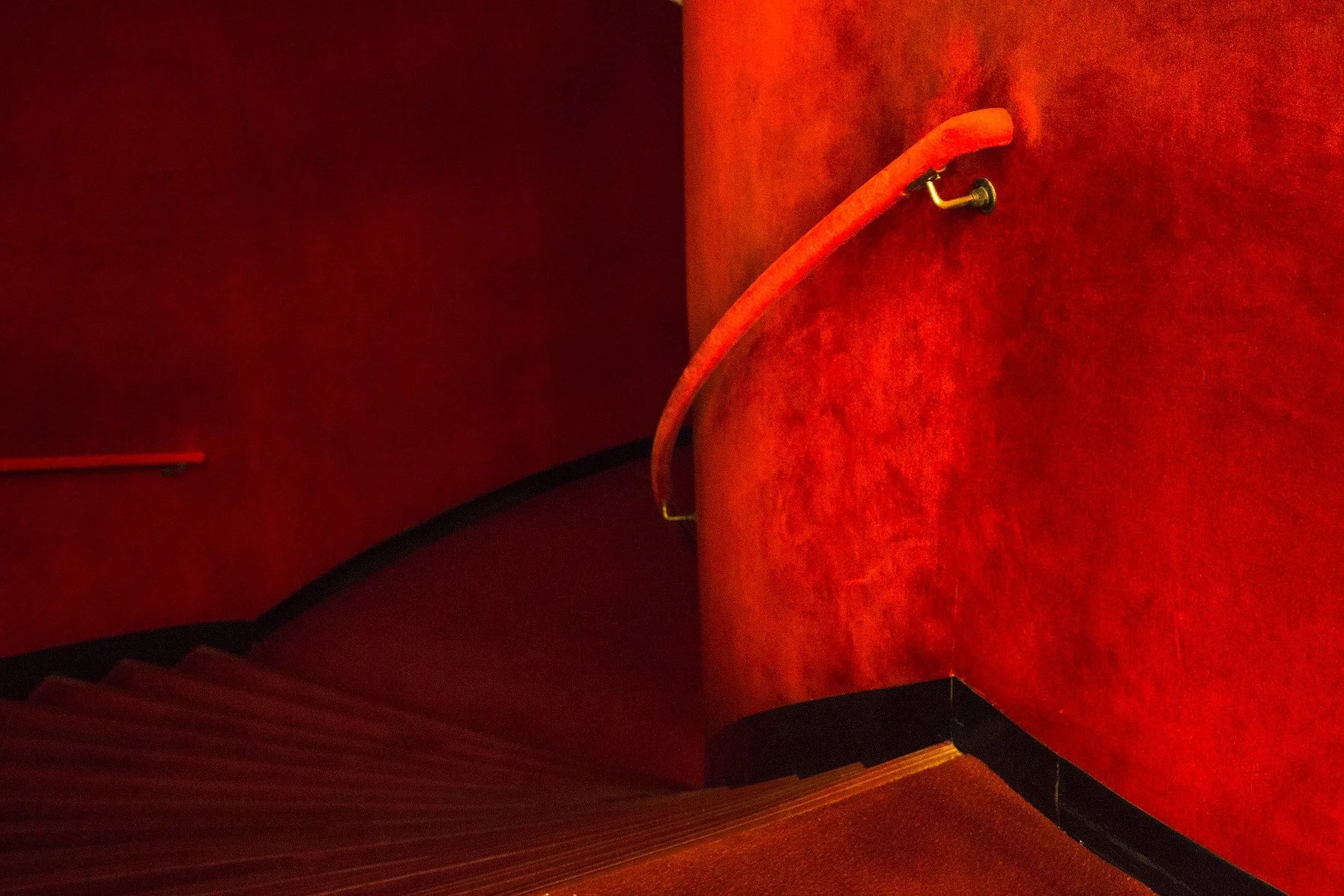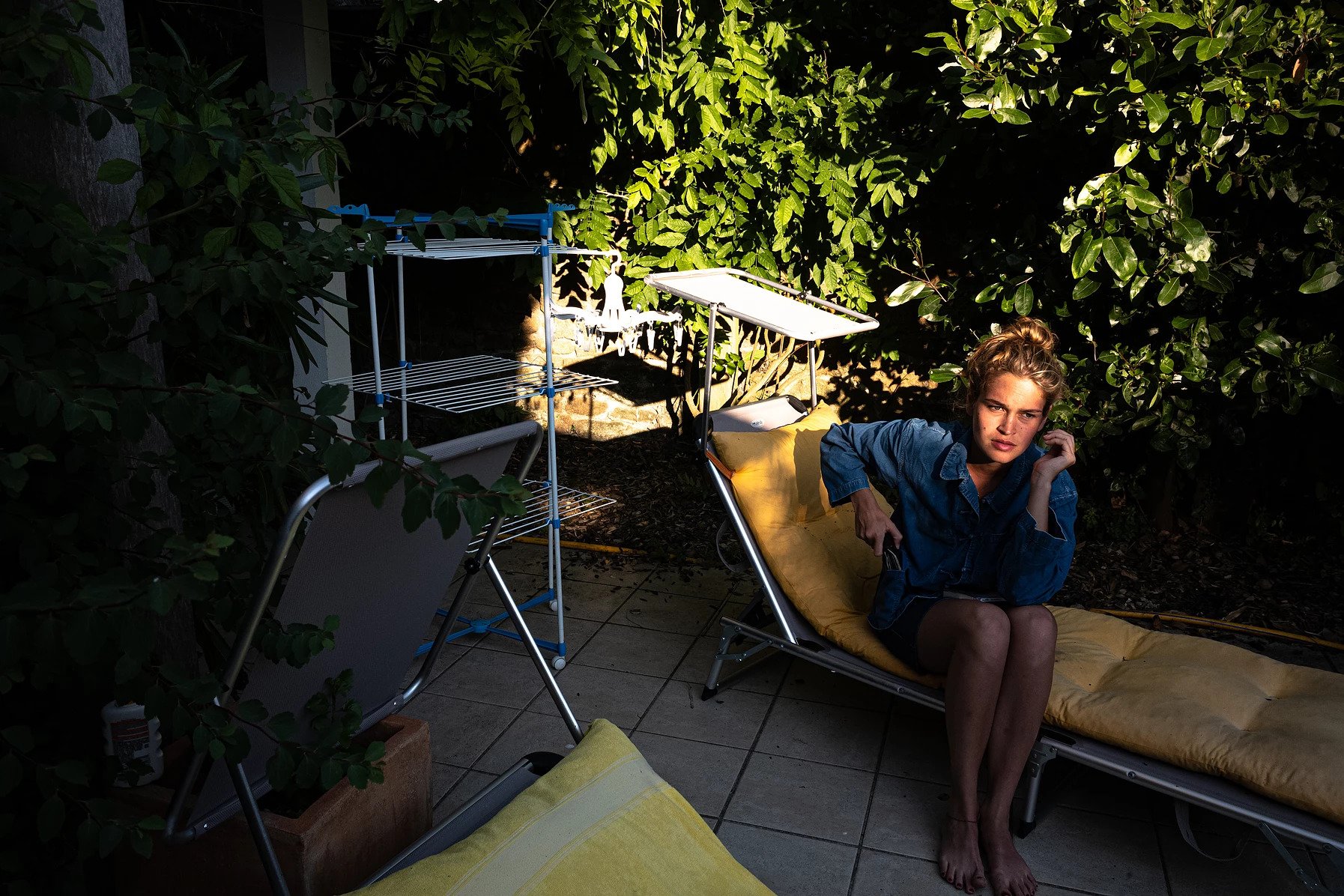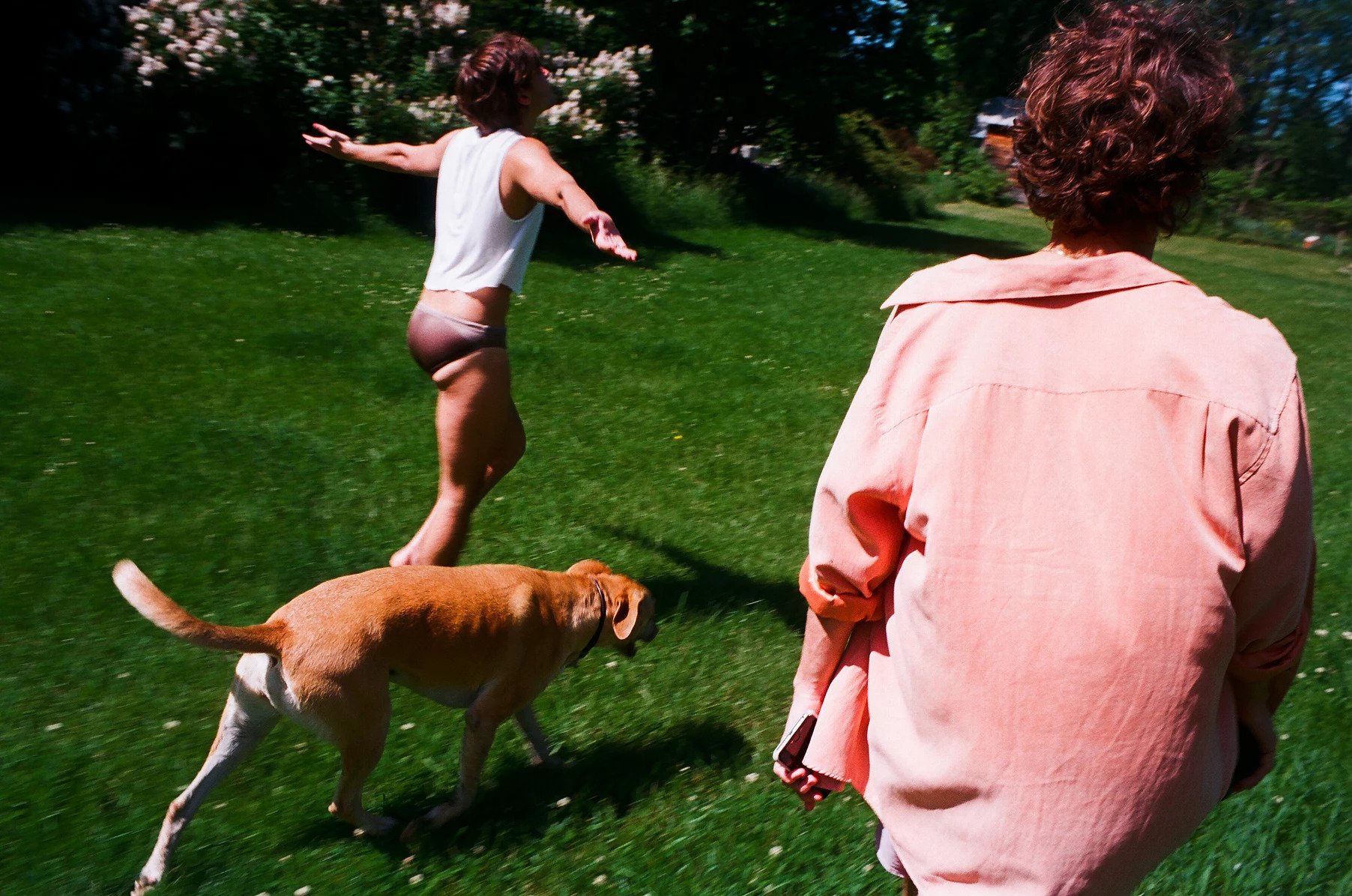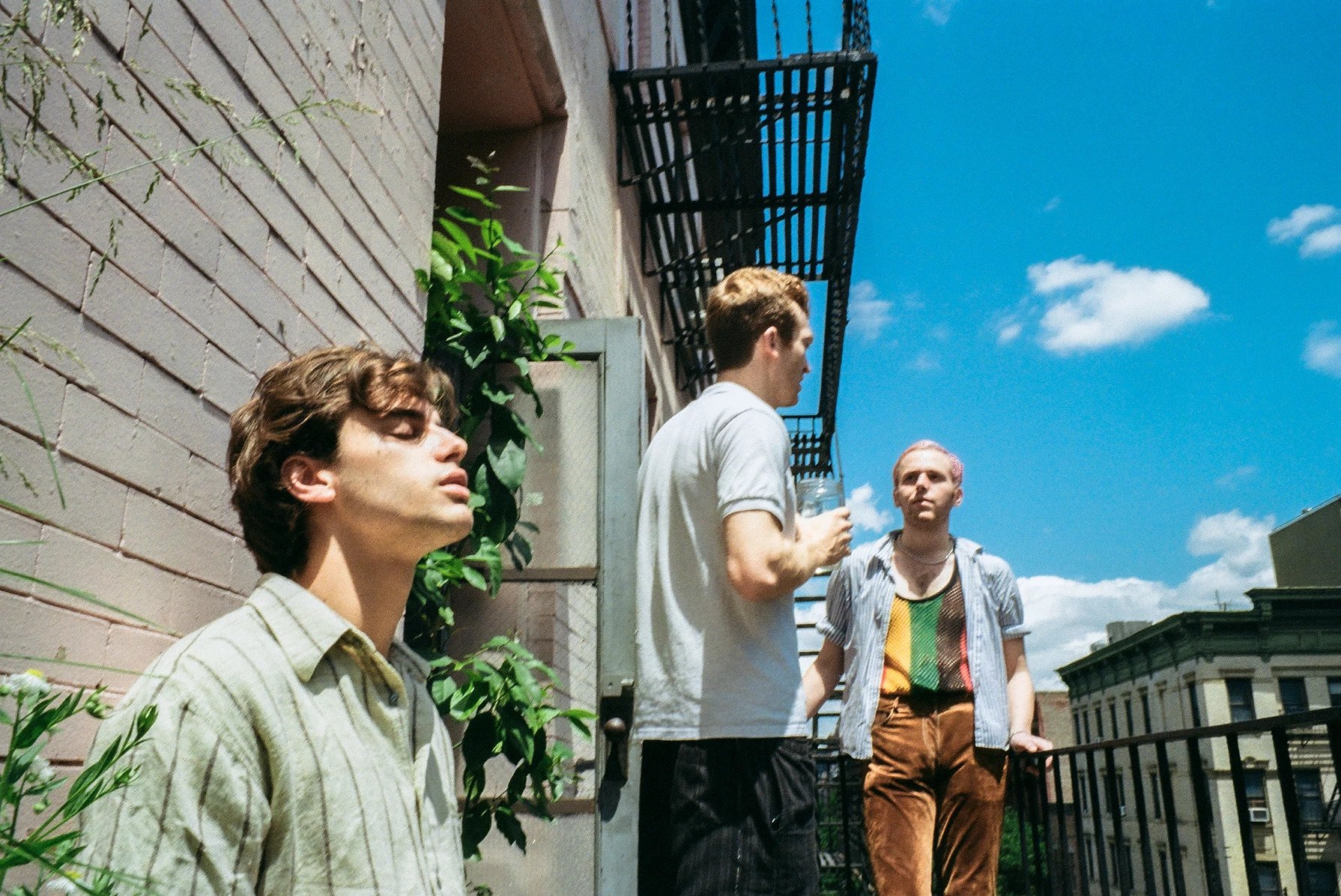Feature by Justin Liang
Photos by JP Schuchter
Entering Victoire Mandonnaud’s one-bedroom apartment on W 113th Street, I was impressed by a profusion of canvas paintings laid upright against the wall in the hallway. In one corner of her bedroom is a keyboard and microphone; in another is a bookcase full of camera equipment. The first thing Victoire shows me is a pair of film photographs she took during her yearlong program at the International Center of Photography (ICP), now framed on the wall: in the first frame, the camera looks out past a green mailbox to a row of hedges and a suburban barn house; the other features a man in a green shirt who stands on a beach and fills the frame, with glimpses of blue sky and a housing project in the background.
Confrontation and Between from En Alerte (2018-2019)
The two photos are distinct in subject matter, but they mirror each other in subtle ways: the green of the man’s shirt and the mailbox; the loneliness of the foregrounded figures; the horizontality of the road and beach; the glimpse of architectural forms in the background. “Through the practice of photography, in the physicality of taking photos, you realize what everyone has in common, and the world makes so much sense,” Victoire tells me.
Victoire is a renaissance woman who has dabbled in many art forms: “photography is the medium where I feel sharpest in what I want to do,” she says, but she first began with painting at the precocious age of eight. “I grew up around painting materials and in an artistic environment,” as her father, retired by the time she was born, had a house in the French countryside where he kept a studio for pottery and painting.
After high school, Victoire enrolled briefly in an art school in Paris. “I was using a lot of paper and pastel, I was smashing things in a violent way because I was really angry. People liked it and I didn’t like that people liked it, because it was abstract expressionist kind of stuff that seemed to be banal, easy, and meaningless.” Her recent work has a deeper emotional quality to it: her canvases are populated with lonely figures who occupy surrealist dreamscapes, lonely even if they are together. “For a while, I was healing from the end of a romantic relationship so I was processing a lot of emotions around that, which meant a lot of colors.”
Some of her later paintings have a more explicit sociopolitical orientation: in one work, the text “we should stop with oil” is incorporated into an eerie dreamscape of houses, human figures, oil derricks, and power plants. Yet, she says, “compared to painting, I feel that photography is more socially engaged. In our world today, people are still put into boxes in terms of sex and race and gender. Photography helps me imagine a world where people are not spoiled by the idea of difference.”
Stopping Oil, 2021
There is a restlessness that drives Victoire to experiment, not only within the arts but across different disciplines. “When I was younger,” she said, “I wanted to be an economist.” She described an adolescent fascination with sociopolitical issues, including the problems of income redistribution and global inequality. These wide-spanning interests influenced her decision to major in anthropology and economics here at Columbia.
Pro-Palestine March in Washington D.C., 2021
In her venture to figure out if art can inspire policy implementation, she has written a play, created a zine, and even made a short film that was inspired by Med Hondo’s Soleil O: “the movie was really funny, but it was also tackling a serious social issue, and it was doing that by making fun of people. I thought, I want to make fun of people too.” After art school in Paris, Victoire enrolled briefly in film school before a series of student strikes put an end to her time there.
Victoire has also written a book of poetry, and produced an album of songs after taking a songwriting workshop. In her music, the same themes emerge: “I think my first album is a combination of romantic songs, and other songs that explore the emotions people feel around sociopolitical issues.” Victoire acknowledges that the range of her interests may come across as overly ambitious. Her songs are on Spotify, but the book of poetry, play, and short film have not been made available to view. She also has ideas for experimenting with sculpture, performance, and installation art.
The struggle of artistic creation is necessarily wrapped up with anxieties around recognition and conventional standards of success. Even painting, she says, can be challenging because “I wasn’t interested in the gallery world. I thought I’d just paint, and wait for someone to like what they see. But then after a point, it becomes destabilizing because I was accumulating a lot of finished work with nowhere to put it.”
The Wrong Exit, 2021
Space I, 2021
There is always the fantasy of escape, enabled in part by family wealth: “I would love to stop studying economics, and I would love to stop going to Columbia, and I would love to just spend a whole day in my father’s home writing, or just doing photography.” Yet driving her on is a desire “to try everything and bring everything to a point of exhaustion so that I don’t want to do it anymore. I have this need to go until the very end of something. It’s the same with relationships.” She wonders if this restlessness will stop when she finds true love.
In the arts, it seems her true love is photography: “it’s who I am. Everything else is just experimentation. When you’re just experimenting without any real intention, then everything is just about emotion, because emotion is what’s in you. With painting or music, I start with emotion because that’s the only thing I have and then I try to add ideas that are meaningful to me.”
Victoire contrasts her approach to photography with that of her schoolwork: “I feel that a lot of scholarship is about making a statement, having an idea and then trying to prove it, but photography is the absence of statement, or at least it is not about trying to prove something. You must first find what is out there in the world. That being said, photography is also in danger of becoming academic. Towards the end of my program, I was asked to write about what I was doing; I didn’t like that, it just made my photography feel flat. I thought my photos were precise enough as to be autonomous and didn’t need explanation.”
Asked about her process, Victoire is adamant that “photography is not just something you can do half time. You have to be a photographer full time.” She describes waking up some days before sunrise and walking all day, going wherever inspiration takes her: the botanical garden one day, Long Island the next. Sometimes she will see someone she’s interested in and follow where they go. “When I was living in Chinatown, I would go out for two hours, then come back and edit my photos, then go out again,” she reminisces.
Selected Portraits
On being asked what her inspirations are, Victoire says, “for painting or music, I tell them I don’t know, but with photography, I do really have people I admire.” She cites Elliott Erwitt as an example––a photographer for Magnum in the second half of the twentieth century, he became famous for his ironic and absurd approach to serious everyday settings. Victoire’s own work displays a preoccupation with the nature of the individual in society and the invisible connections between otherwise disparate seeming people and places.
In her restless need to experiment with different media, Victoire’s wide range of artwork has a searching, restive quality. Yet her photography shows a different side: one more meditative and more at ease in the universe, curious to explore the world and open to its wonders. Victoire’s quest appears far from over, but one might hope it is precisely in the process of being lost that she might ultimately find herself.
The entirety of Victoire’s work can be found on her website, www.victoiremandonnaud.com, and Spotify artist page The Victories. You can also find her on Instagram @vmandonnaud.
